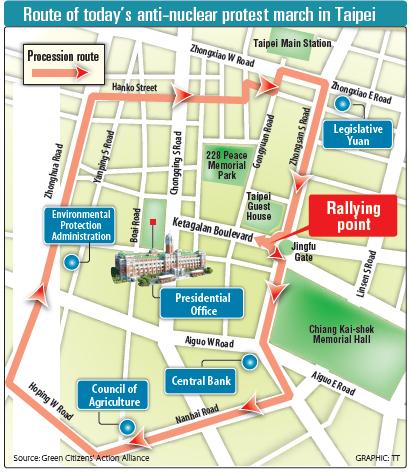|
Nuclear Power Debate:
Academics slam referendum question
ATOMIC ANGST: Lai Chen-chang, president of the
National Taipei College of Business, said the nation would pay a heavy price
should a nuclear disaster occur
By Shelley Shan / Staff reporter

The Taiwan Environmental Protection Union
yesterday criticized the Chinese Nationalist Party’s (KMT) question for a
proposed referendum on halting the construction of the Fourth Nuclear Power
Plant, saying the text showed that the party was exploiting the shortcomings of
the Referendum Act (公民投票法) to ensure construction continues.
The wording of the proposal, which was unveiled on Thursday, says: “Do you agree
that the construction of the Fourth Nuclear Power Plant should be halted and
that it not become operational?” (你是否同意核四廠停止興建不得運轉).
National Taiwan University professor Shih Hsin-min (施信民) said yesterday that the
ruling party is trying to use the requirement that states that at least 50
percent of voters must submit ballots for a referendum to be valid to veto the
proposal to halt construction of the nuclear power plant.
“They [the KMT] were really wearing their hearts on their sleeves — which say:
‘Let the construction continue,’” said Shih, who is also the president of the
Taiwan Environmental Protection Union.
He said the government has always supported the construction of the power plant
ever since it decided to resume the project on Feb. 14, 2001, adding that
position has recently been reiterated by both President Ma Ying-jeou (馬英九) and
Premier Jiang Yi-huah (江宜樺).
“They should ask if the public agree that construction of the Fourth Nuclear
Power Plant be continued and that it become operational,” Shih said. “That would
be a real referendum on government policy.”
Lai Chen-chang (賴振昌), president of the National Taipei College of Business, said
the nation would pay a heavy price if a nuclear disaster strikes, no matter how
low the chances of it happening. He said not only this generation, but the next,
would continue to pay the price, adding citing the example of the Chernobyl
nuclear disaster.
“An incorrect government policy is worse than a corrupt government,” Lai said.
“The Ma administration has tried to explain its policy by pointing out the
costs, but it has ignored the costs that the nation would have to pay for a
nuclear disaster.”
National Taipei University economics professor Wang To-far (王塗發) said that the
KMT’s proposal completely downplays the negatives of nuclear energy.
“What we are facing is an evil, cold-blooded and shameless government,” Wang
said. “They said what happened at [the] Fukushima [Dai-ichi nuclear power plant
in Japan in 2011] was mainly the result of human error, as if we are running
safe nuclear power plants. Haven’t we learned the lesson of Fukushima?”
National Chiao Tung University civil engineering professor Liou Gin-show (劉俊秀)
said that those living within a 30km radius of the Fukushima Dai-ichi nuclear
power plant had to evacuate after the nuclear accident there. Were the same rule
to apply here, 7 million people would have to be evacuated in the event of a
disaster, he said.
“The rule here is 8km. Can they even do that?” Liou asked.
With anti-nuclear protest marches due to take place nationwide today, the union
said more academics should come out and support the cause.
According to the Green Citizens’ Action Alliance, the civic group that initiated
today’s protests, more than 22,000 people have sent text messages endorsing the
movement to abolish nuclear power and it estimated that the march in Taipei
would draw more than 30,000 people.
Additional reporting by CNA
|
![]()
![]()
![]()